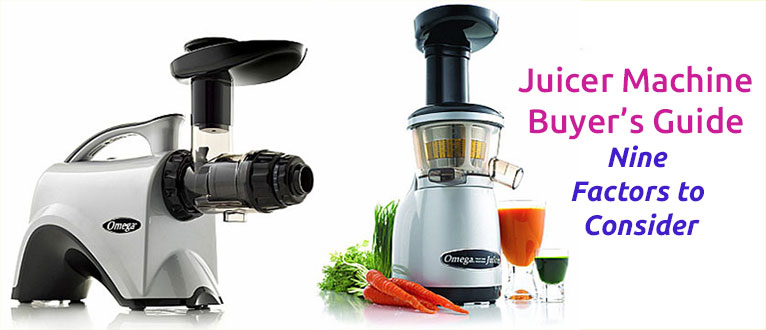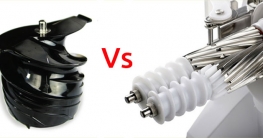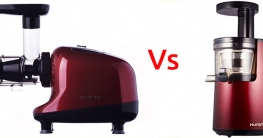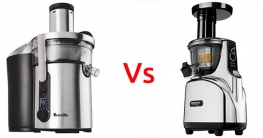Juicer Machine Buyer’s Guide – Nine Factors to Consider

When choosing a juicer machine, like any electric appliance, it is important to educate yourself about what is available in the market in order to get the best deal. This how to choose a juicer machine guide will help you to understand what features to look for and how to compare them to choose the right juicer machine that offers the greatest value for what you want, and/or need.
A lot of people tend to buy the lowest priced juicer machine when a small increase in price would buy a significantly better product. It is important that after reading this how to choose a juicer machine guide you keep a checklist of your needs and follow some basic guidelines in your buying decision.
1. Lifestyle Needs
Determine what types of vegetables and fruits you will be juicing in your new juicer machine. If you will be juicing mostly leafy vegetables like kale, wheatgrass and spinach, which are popular ingredients in green drinks, a masticating juicer will get more juice from fewer vegetables. If you will be juicing a wide variety of fruits and vegetables, consider a centrifugal juicer, which will more evenly blend any consistency of fruit or vegetable.
2. Feed Chute Size
Look at the size of the feed chute on juicer machines before you buy . This saves preparation time because you don’t have to cut up the fruits into smaller pieces. The smaller the mouth of the feed chute, the smaller you will have to cut up produce before you juice it.
3. Motor Power
A powerful juicer can extract the juice from certain produce easier than others, for example soft veggies like cucumbers and tomatoes are easily juiced by normal juicer, but you’ll need a more powerful appliance for harder vegetables such as beets. A minimum guideline for centrifugal juicers that you’ll see frequently is 1/4 horsepower (250 watts). This is a weak machine and can wear out quickly from regular use. The typical recommendation for centrifugal models is 700 watts or more. For masticating juicers 250 watts is ample as it run slower.
4. Motor Noise
Next the noise level is something you want to evaluate. Most high quality juicer machines are very quite and this is not a big deal. If you live on your own it is probably not an issue but if you have a family and you want to make juice in the morning, it may wake people up. Masticating juicers provide quiet operation, due to the low auger speed. Many centrifugal power juicers sound like a plane trying to take off!
5. Ease of Cleaning
Cleaning a juicer can be particularly cumbersome, especially when you consider all the dried pulp that can accumulate after several juicing sessions. Some juicers eject the pulp into a separate container for easier cleaning. You only have to empty that container. This feature is usually not found in centrifugal juicers, which takes a little more work to clean up. So be sure that the particular juicer you get has cleaning features or can be disassembled easily and has dishwasher safe components.
6. Warranties
Make sure your juicer machine has a decent warranty. A one-year warranty is standard on most models, although some manufacturers offer the option of extending this to two or more years. Note that longer warranties are generally associated with higher price tags, so check the small print before buying.
7. Price Range
The least expensive juicers are hand juicers that use the pressure of your hand to squeeze out the juice. Moderately priced masticating or centrifugal juicers are designed for home use and are usually made of plastic. Commercial juicers are usually more expensive as well as more durable. Frequency of use and ease of use are both important things to keep in mind when you decide how much money you will spend on your new juicer machine.
If your needs are simple, you should be satisfied with a basic model at a very basic price. Compare prices for juicer machines with all the features you need before you decide which juicer to buy. There are many makes and models available both in stores and on the Internet.
8. Brands to consider
Considering the machine brand before purchasing is essential as the market today is filled with numerous brands – and more brands are expected to hit the market as the population gets more health conscious. Popular brands include Breville, Champion, Omega, Hurom, Juiceman, Jack LaLanne, Green Star, Hamilton Beach, Waring etc ; all have models worthy of consideration. For details about this brands please visit their websites and browse some of the popular models to get an idea of prices, features and brands. Reading some reviews is a good a idea as well. Resist impulse purchases, however.
9. Should I consider a Commercial Juicer Machine?
For most people, a commercial juicer for home use is overkill and not really necessary. However, if you have a large family and need to do a lot of juicing or if you have a garden or fruit trees in the yard and you plan on doing your juicing in bulk, getting a commercial juicer for home use may be exactly what you need.
A commercial juicer is going to be more expensive up front but if you are going to be doing a lot of juicing you’ll need a machine that is durable, something that is capable of continuous juicing without burning out the motor.
Take all of the guidelines discussed in this how to choose a juicer machine guide into consideration when comparing the juicer machine models. Doing your homework and weighing what one machine will do in comparison with another, is what will be best in helping you make your final decision.
Disclosure – Any/all of the links on primejuicer.com are affiliate links from which we receive a small commission from sales of certain items.


